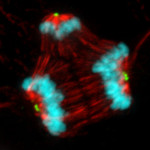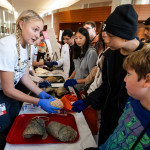Campus news Latest News
From ********* to EZacces$! Your browser extension could grab your password and sensitive info
The researchers found that a huge number of websites — about 15% of more than 7,000 they looked at — store sensitive information as plain text in their HTML source code.
UW–Madison students, educators win Alliant awards
Students Olivia Asare and Naomi Lewis and faculty members Kristy Burkholder and Howard Schweber were honored for their achievements.
Common chemotherapy drugs don’t work like doctors thought, with big implications for drug discovery
Findings reveal the likely reason why certain chemotherapies are effective for many patients. Importantly, they also help explain why attempts to find new chemo drugs based solely on stopping cellular division have been so disappointing.
Science on the Square: A festival of learning
Rainfall failed to stop people of all ages from exploring science hands-on at the sixth annual Science on the Square event on Oct. 19.
From graduation rates to degrees conferred, records fall at UW–Madison
The 2022-23 academic year was a record-breaker for student outcomes at the University of Wisconsin–Madison. Among the milestones: The four-year graduation rate rose to 75.5%, the highest ever, and the university conferred a record number of total degrees, driven by a record number of bachelor’s and master’s degrees.
UW-Madison recertified as platinum Bicycle Friendly University
According to the league, certified institutions address health and environmental challenges by creating welcoming, inclusive environments for people who bike.
UW Arboretum Director Karen Oberhauser announces retirement
Since 2017, Oberhauser has strengthened ties between the Arboretum and several university departments, established an Arboretum fellowship program for graduate students and grew citizen science programming and partnerships.
UW leaders, governance discuss future of pay plan
University of Wisconsin–Madison leaders continue to meet with shared governance leaders to discuss the path forward for a pay plan for UW employees.
Fall scenes color UW–Madison’s campus
After an extended summer, UW–Madison's campus transitions to fall colors and cooler weather.
Author David McRaney to give Go Big Read keynote Nov. 7
McRaney will discuss his book with Chancellor Jennifer L. Mnookin at this year’s Go Big Read keynote event on Nov. 7 from 7 to 8:30 p.m. at Memorial Union’s Shannon Hall.
Kids embrace science at Hands-On Expo
Spread throughout the main floor of the Discovery Building, the event offered kids the opportunity to hold brains, make objects float with superconductivity and jump into an immersive Virtual Reality experience.
Family Weekend 2023: We’re all Badgers now!
Planned activities included everything from cheering on the women's hockey team to walking on Lakeshore Path to making crafts at Wheelhouse Studio.
Study finds mindfulness training may not be enough to increase eco-friendliness
The innovative study marks the first time researchers have conducted a randomized controlled trial to test whether a direct relationship exists between meditation and eco-friendly attitudes and behaviors.
Wisconsin designated as Regional Tech Hub for biohealth – with UW–Madison helping lead the way
The Tech Hub designation opens the doors for millions in federal funding, as well as the opportunity to bring significant new private investment to the state’s biohealth industry. It is expected to generate a substantial number of new jobs, further boosting the state’s biohealth sector and enhancing employment opportunities for local communities.
With UW–Madison assist, project could accelerate nation’s clean energy transition
The project would be the first to demonstrate — at a commercial scale — a closed-loop, carbon dioxide-based energy storage system and could validate the technology for wide-scale deployment in the United States.
Expansion of First Nations Cultural Landscape Tour will increase capacity of popular educational offering
The tour examines the 12,000-plus years of human existence documented along the shores of Lake Mendota, particularly the history of the Ho-Chunk Nation, on whose ancestral land the university now sits.




















